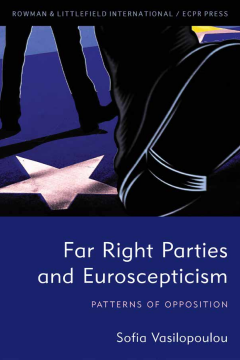
Additional Information
Book Details
Abstract
Why do parties that belong to the same party family address the EU question differently? This book addresses this question through a systematic analysis of the EU positions of far right parties in Europe.
Starting from the assumption that far right parties are rational actors, the book argues that the way in which they may interpret structural incentives depends on their relationship with democracy, their attitude towards the polity, their target electorate/social basis, and their behaviour towards competitors. Classification on these indicators leads to the identification of three far right party models: anti-system, anti-liberal, and normalised.
Given that the EU is a core issue in far right parties’ toolkit, it becomes a key policy in party competition. Anti-system far right parties tend to opt for a rejectionist position on the EU; anti-liberal far right parties tend to be conditional Eurosceptics; and normalised far right parties tend to adopt a compromising position on the EU. The specific Eurosceptic frame that parties may prioritise depends on the domestic political context and how they may perceive national identity.
This book’s findings are relevant in light of Europe’s political and economic crises, and rising public support for Eurosceptic ideas and far right parties.
In this ground-breaking book Vasilopoulou does what the very best comparative scholarship should do. She takes the phenomena of Euroscepticism and the far-right and, through rigorous case study combined with wider comparisons, she illuminates cases and recasts our understanding of both Euroscepticism and far right parties. This book is empirically rich and conceptually bold and grounded. Anyone working in these areas will need to engage with the ideas in this book.
Paul Taggart, Professor of Politics, University of Sussex
Using a comparative lens, Vasilopoulou sets out to identify patterns in far right parties’ opposition against the European Union. The result is a detailed and multilayered analysis showing that far right party Euroscepticism is by no means uniform but varies from complete rejection of the European Union to selective opposition and even weak support of aspects of European integration. This book represents a significant and valuable contribution to the literature on the study of far right parties.
Jens Rydgren, Chair in Sociology, Stockholm University
Sofia Vasilopoulou is a Senior Lecturer at the Department of Politics, University of York. Her work examines political dissatisfaction with democracy and democratic institutions across Europe. Her work has appeared in the European Journal of Political Research, Journal of Common Market Studies, Journal of European Public Policy, and Government and Opposition among others. She is co-author of “The Golden Dawn’s Nationalist Solution: Explaining the Rise of the Far Right in Greece” (2015) and co-editor of “Nationalism and Globalisation: Conflicting or Complementary?” (2011).
With Far Right Parties and Euroscepticism Sofia Vasilopoulou makes important conceptual, empirical and theoretical contributions to two of the most popular themes in party politics, moving beyond popular but simplistic stereotypes and instead highlighting the complexities of both Euroscepticism and the far right.
Cas Mudde, Associate Professor, University of Georgia
